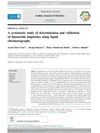 January 2015 in “Przegla̧d dermatologiczny”
January 2015 in “Przegla̧d dermatologiczny” 308 nm excimer light therapy may help hair regrowth in alopecia areata with delayed results and no serious side effects.
 February 2014 in “Medicine - Programa De Formación Médica Continuada Acreditado”
February 2014 in “Medicine - Programa De Formación Médica Continuada Acreditado” The document concludes that non-scarring alopecias can be reversed, but scarring alopecias cause permanent hair loss.
 December 2013 in “Biomedical and biopharmaceutical research”
December 2013 in “Biomedical and biopharmaceutical research” Nanotechnology shows promise for better drug delivery and cancer treatment.
 January 2009 in “Springer eBooks”
January 2009 in “Springer eBooks” The document concludes that treating skin conditions should include psychological care and a multidisciplinary approach is essential for effective management.
 June 2008 in “British Journal of Dermatology”
June 2008 in “British Journal of Dermatology” UK medical students lack dermatology education, liver biopsy patients with risk factors show more fibrosis, and certain fungi resist drugs due to melanin; genetics may influence female hair loss.
 January 2019 in “Arabian Journal of Chemistry”
January 2019 in “Arabian Journal of Chemistry” Method found to accurately identify finasteride impurities using liquid chromatography.

Ovol2 is crucial for hair growth and skin healing by controlling cell movement and growth.
 6 citations,
November 2021 in “Oncology Research and Treatment”
6 citations,
November 2021 in “Oncology Research and Treatment” Low Vitamin D receptor levels in breast cancer are linked to worse outcomes and more bone metastases, and could be a marker for prognosis.
22 citations,
July 2020 in “iScience” Sox21 is crucial for tooth development and enamel formation by preventing cells from changing into a different type.
15 citations,
January 2022 in “Immune Network/Immune network” New targeted immunotherapies are improving treatment for inflammatory skin diseases.
 9 citations,
February 2022 in “Biomolecules”
9 citations,
February 2022 in “Biomolecules” Drinking a lot of alcohol increases the risk of prostate cancer and can worsen the condition.
2 citations,
November 2023 in “Biomolecules” WNT signaling is crucial for skin development and healing.
 August 2024 in “Current Issues in Molecular Biology”
August 2024 in “Current Issues in Molecular Biology” Key genes and RNAs related to hair growth in sheep were identified, aiding future breeding improvements.
February 2023 in “Pharmaceutics” 62 citations,
January 2015 in “Journal of Dermatological Science” New genetic discoveries may lead to better treatments for alopecia areata.
61 citations,
April 2023 in “Bioactive Materials” Microneedles are effective for painless drug delivery and promoting wound healing and tissue regeneration.
36 citations,
July 2007 in “Journal of Investigative Dermatology” Certain HLA class II alleles increase or decrease the risk of alopecia areata.
 18 citations,
December 2021 in “Journal of Nanobiotechnology”
18 citations,
December 2021 in “Journal of Nanobiotechnology” The nanofibers effectively treated infected diabetic wounds by killing bacteria and aiding wound healing without toxicity.
 16 citations,
November 2011 in “PubMed”
16 citations,
November 2011 in “PubMed” The treatment improved hair growth in people with male pattern baldness.
 15 citations,
January 2020 in “Experimental Dermatology”
15 citations,
January 2020 in “Experimental Dermatology” The document concludes that understanding and treatments for alopecia areata have significantly advanced, now recognizing it as an autoimmune disorder.
 14 citations,
January 2020 in “Frontiers in Endocrinology”
14 citations,
January 2020 in “Frontiers in Endocrinology” OCT4 helps granulosa cell growth in early-stage follicles, and FSH increases OCT4 through specific pathways.
13 citations,
January 2023 in “Frontiers in Nutrition” Lindera aggregata has many beneficial compounds that can help prevent and manage diseases.
3 citations,
December 2023 in “Biomedicines” PRP therapy helps skin heal and improve by promoting cell growth and repair.
 3 citations,
December 2020 in “Polski merkuriusz lekarski : organ Polskiego Towarzystwa Lekarskiego”
3 citations,
December 2020 in “Polski merkuriusz lekarski : organ Polskiego Towarzystwa Lekarskiego” People with androgenetic alopecia often experience high stress, but the stress doesn't affect how the disease progresses or how well different treatments work.
 2 citations,
June 2023 in “Gels”
2 citations,
June 2023 in “Gels” Injectable hydrogels are becoming increasingly useful in medicine for drug delivery and tissue repair.
2 citations,
June 2022 in “Cells” 3D cell cultures are better for testing hair growth treatments than 2D cultures.
 1 citations,
August 2023 in “Advanced Drug Delivery Reviews”
1 citations,
August 2023 in “Advanced Drug Delivery Reviews” Microneedles are promising for long-acting drug delivery and can improve patient compliance, but more data is needed to confirm their effectiveness.
 1 citations,
July 2023 in “International Journal of Biological Macromolecules”
1 citations,
July 2023 in “International Journal of Biological Macromolecules” The study created a new hair loss treatment paste that regrows hair faster and with fewer side effects than minoxidil alone.
 1 citations,
January 2022 in “Stem cell biology and regenerative medicine”
1 citations,
January 2022 in “Stem cell biology and regenerative medicine” New methods to test hair growth treatments have been developed.
 1 citations,
August 2021 in “Frontiers in Genetics”
1 citations,
August 2021 in “Frontiers in Genetics” Certain genes related to sulfur metabolism are more active during the growth phase of Cashmere goat wool, and melatonin might help this process.




















